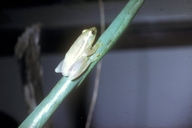|
Description
A small, long, very slender, sharp-nosed savanna-living Hyperolius (19–24 mm). Dorsum translucent green, uniform or with diffuse darker spots. A light yellow dorsolateral and canthal stripe normally present in males, sometimes in females. Sometimes a fine middorsal line of chromatophores is present. Ventrum white; limbs, feet and discs green, or discs sometimes reddish. Pupil horizontal. The males are of the same size as the females which is unusual among Hyperolius. In some populations the females lack the light dorsolateral stripe, while it is present in others.
The tadpole attains a size of 33 mm (10+23) and has a tooth formula of 1/3.
Distribution and Habitat
Country distribution from AmphibiaWeb's database: Angola, Botswana
A common and widespread element in the savanna fauna, most noticeably in the more humid, dense savanna, from central West Africa (central Côte d’Ivoire) to East Africa and further south, and into the savanna of R. D. Congo and Angola. Due to confusion with H. benguellensis, H. poweri and H. sp., names which may or may not cover valid species and which may replace H. nasutus or may exist sympatric with it, an exact distribution cannot be given.
Life History, Abundance, Activity, and Special Behaviors
The call is a high-pitched scream consisting of an initial sound and a small number of elements.
The eggs are laid submerged in water in batches of about 200. They have a white and greenish-grey pole.
Comments
This species is called Hyperolius acuticeps (Channing et al. 2002) or Hyperolius igbettensis in some recent literature. Due to nomenclatorial uncertainty, the well established name H. nasutus is used here (Schiøtz 2006).
Several subspecies have been described, but our understanding of the variation within this species is not sufficient to establish such subspecies. Furthermore the complex may contain several cryptic species. Thus in southern Africa, the very similar H. benguellensis has recently been recognized as a separate species.
Channing has stated that the South African populations differ,
e.g. in voice, from more northern populations of H. nasustus and should be recognised as H. poweri Loveridge 1938.
There is a form in south-western Cameroun southwards at least as far as R. Congo, probably to Kinshasa in R. D. Congo, which is probably a distinct species. It is similar to H. nasutus but differs in morphology, having a briefer snout and a broader body, and has a somewhat different voice and habitat preference (bushland and humid savanna). This species is being studied by Amiet, and has been recorded as Hyperolius sp. aff. nasutus by Largen and Dowsett-Lemaire (1991) from R. Congo.
This account was taken from "Treefrogs of Africa" by Arne Schiøtz with kind permission from Edition Chimaira publishers, Frankfurt am Main.
References
Channing, A., Moyer, D., and Burger, M. (2002). ''Cryptic species of sharp-nosed reed frogs in the Hyperolius nasutus complex: advertisement call differences.'' African Zoology, 37(1), 91-99.
Largen, M. J. and Dowsett-Lemaire, F. (1991). ''Amphibians (Anura) from the Kouilou River Basin, République du Congo.'' Tauraco Research Report, 4, 145-168.
Schiøtz, A. (1999). Treefrogs of Africa. Edition Chimaira, Frankfurt am Main.
Schiøtz, A. (2006). ''Reflections on the Hyperolius nasutus group.'' Alytes, 24(1-4), 61-71.
Originally submitted by: Arne Schiøtz (first posted 2001-01-09)
Edited by: NW (2008-03-11)Species Account Citation: AmphibiaWeb 2008 Hyperolius nasutus: Long Reed Frog <https://amphibiaweb.org/species/556> University of California, Berkeley, CA, USA. Accessed Jun 13, 2025.
Feedback or comments about this page.
Citation: AmphibiaWeb. 2025. <https://amphibiaweb.org> University of California, Berkeley, CA, USA. Accessed 13 Jun 2025.
AmphibiaWeb's policy on data use.
|
